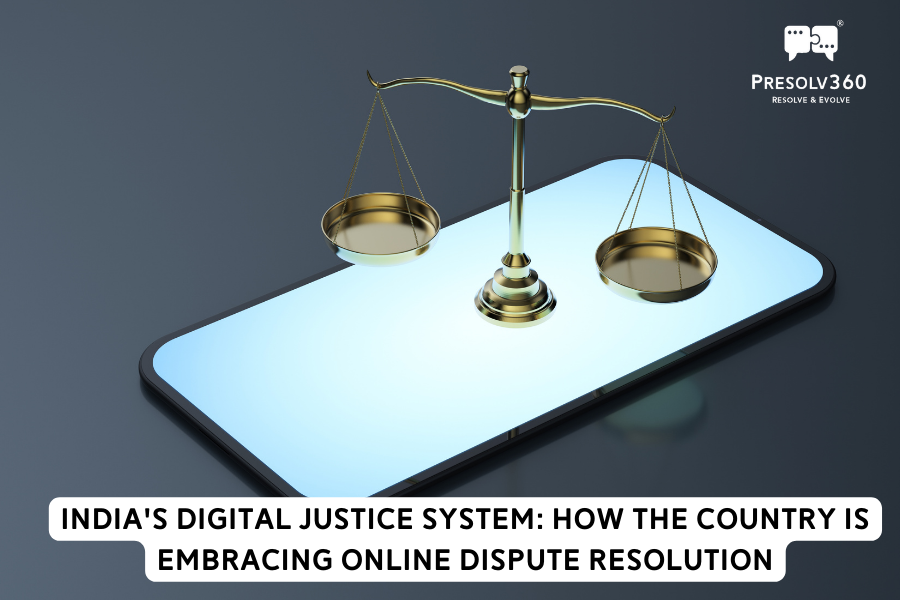Digitization in India has undergone substantial and transformative evolution in recent years, underpinned by multiple tactical plans and policies. These aim to harness technology’s potential for enhancing governance, driving economic development, and elevating overall living standards. Currently, India is at a pivotal point in its evolution. It is moving from conventional methods of dispute resolution to a more modern and digital-centric framework. This is similar to how the mass adoption of smartphones and cost-effective data plans have transformed India’s consumer market. The rise of online dispute resolution (ODR) has the potential to dramatically alter the nation’s approach to dispute resolution. This progressive method settles disputes in a streamlined and accessible way, signifying a major change in India’s dispute resolution ecosystem. To understand what ODR is, please refer to our concept note here.
In this blog post, we will specifically understand how India has embraced ODR in the past few months:
Online Dispute Resolution in the securities market
The Securities and Exchange Board of India (SEBI) recently introduced a circular on online dispute resolution in the Securities Market. It follows the gazette notification of the SEBI (Alternative Dispute Resolution Mechanism) (Amendment) Regulations, 2023, dated July 3, 2023.
This circular established an Online Dispute Resolution Portal (ODR Portal) to resolve disputes within the Indian Securities Market. The ODR Portal will resolve disputes between investors/clients and listed companies or specified intermediaries/regulated entities in the securities market. Additionally, it covers disputes between institutional or corporate clients and specified intermediaries/regulated entities.
Before initiating dispute resolution through the Portal, the investor/client must attempt to resolve the grievance directly. If the grievance remains unresolved, the investor/client can escalate it through the SEBI Complaints Redress System (SCORES) Portal. The investor/client can initiate the Online dispute resolution process only after exhausting all available options for resolution. There shall be no fees for registration of a complaint/dispute on the ODR Portal.
The Master Circular provides a comprehensive framework to ensure that the investor is protected at each stage of the process.
Explicit recognition of the term “digital office” in the DPDP Act
The Digital Personal Data Protection Act, 2023 (also known as DPDP Act or DPDPA-2023) is a statute to provide for the processing of digital personal data in a manner that recognises both the right of individuals to protect their personal data and the need to process such personal data for lawful purposes and for matters connected therewith or incidental thereto.
A “digital office”, as envisioned in the DPDP Act, is more than a virtual space. It is defined as “an office that adopts an online mechanism wherein the proceedings, from receipt of intimation or complaint or reference or directions or appeal, as the case may be, to the disposal thereof, are conducted in online or digital mode.”
This represents a complete integration of digital communications, innovative technologies, and streamlined procedures to conduct proceedings online from initiation to completion. The mandate of the Data Protection Board is to be a digital office “as far as practicable.” Hence, as per the defined procedure of the Board in the DPDP law, the receipt of complaints and the allocation, hearing, and pronouncement of decisions should be digital by design. They require the board to adopt techno-legal measures as prescribed in this regard. The Appellate Tribunal, tasked with hearing appeals under the Act, is also directed to operate as a digital office “as far as practicable” with the receipt of the appeal, hearing, and pronouncement being digital by design. It is needless to point out that such procedures embody the principles of ODR for providing seamless, efficient dispute resolution services without in-person hearings.
To know more about digital office, please refer to our op-ed here.
Explicit recognition of “digital evidence,” and any electronic communication such as messages, call recordings, and emails, as well as electronic communication devices in the Bharatiya Nagarik Suraksha Sanhita, 2023 (formerly CrPC)
In a country where legal proceedings have historically been bound by paperwork and physical evidence, this is a transformative step. It aligns the legal infrastructure with the rapid technological advancements that have permeated every other sector of society. The inclusion of digital evidence broadens the scope of what is admissible in court, potentially speeding up legal processes and making them more efficient.
India has indeed been making significant strides toward digitizing its justice system to improve efficiency, transparency, and accessibility. The desire for more accessible, efficient, and cost-effective dispute-resolution mechanisms, particularly in a country with a large and diverse population, drives the need for ODR in India. As technology continues to advance and awareness of ODR grows, keep watching this space for the latest developments and highlights!




